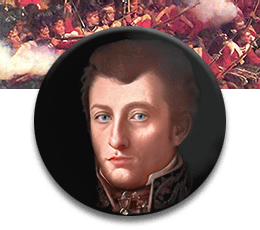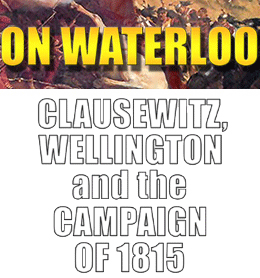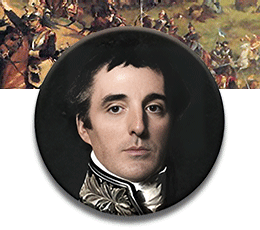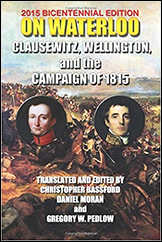


Carl von Clausewitz and Arthur Wellesley, 1st Duke of Wellington. On Waterloo: Clausewitz, Wellington, and the Campaign of 1815. Ed./trans. Christopher Bassford, Daniel Moran, and Gregory W. Pedlow. Clausewitz.com, 2010. ISBN-10: 1453701508. ISBN-13: 9781453701508. 318pp. List price: $18.00.
This site contains the full text of the printed book, plus web-extras (full-color maps, documents, etc.)
Presented by |
ON THIS PAGE:
(with links to the full text, Chapter-by-Chapter)
• A Note on Sources and Translations
 ON WATERLOO is built around a new and complete translation of Clausewitz's study of the 1815 Waterloo campaign (published in Berlin, 1835), which is a strategic analysis of the entire campaign (not just the Battle of Waterloo). It includes the Duke of Wellington's detailed 1842 response to it—the only essay Wellington ever wrote concerning the battle. It contains Wellington's initial battle report; two of Clausewitz's post-battle letters to his wife Marie; correspondence within Wellington's circle concerning Clausewitz's work; Clausewitz's campaign study; Wellington's memorandum in response; and enlightening essays by the editors. The Campaign of 1815 was one of Clausewitz's last campaign studies and its findings were never incorporated into his famous treatise On War. Thus, since this is the first published English translation, most readers will find it new material. SEE REVIEWS by MajGen David T. Zabecki in The Journal of Military History and Bruno Colson in War In History. See also Jon Sumida's comment immediately below.
ON WATERLOO is built around a new and complete translation of Clausewitz's study of the 1815 Waterloo campaign (published in Berlin, 1835), which is a strategic analysis of the entire campaign (not just the Battle of Waterloo). It includes the Duke of Wellington's detailed 1842 response to it—the only essay Wellington ever wrote concerning the battle. It contains Wellington's initial battle report; two of Clausewitz's post-battle letters to his wife Marie; correspondence within Wellington's circle concerning Clausewitz's work; Clausewitz's campaign study; Wellington's memorandum in response; and enlightening essays by the editors. The Campaign of 1815 was one of Clausewitz's last campaign studies and its findings were never incorporated into his famous treatise On War. Thus, since this is the first published English translation, most readers will find it new material. SEE REVIEWS by MajGen David T. Zabecki in The Journal of Military History and Bruno Colson in War In History. See also Jon Sumida's comment immediately below.
"On Waterloo is essential reading for those seeking an understanding of Clausewitz’s distinctive approach to historical case study as the basis of practical knowledge of armed conflict. Clausewitz’s history of the campaign of 1815 incorporates methods of critical analysis explained in Book II of On War, which were addressed primarily to the observation and assessment of past cases of strategic and operational decision-making by commanders-in chief. The Bassford, Moran, and Pedlow edition provides a highly readable translation of a work previously accessible only in German that illustrates Clausewitz’s approach to the replication and evaluation of the experience of high command. In addition, this volume offers the Duke of Wellington’s appreciative if not wholly favorable response to a partial translation of Clausewitz’s work, and several other lesser historical texts. The supporting essays by the editors are well-written and well-informed."
University of Maryland,
author, Decoding Clausewitz:
A New Approach to On War
(University Press of Kansas, 2008)
See also: Paul Schuurman [Faculty of Philosophy, Erasmus University Rotterdam, The Netherlands], "What-If at Waterloo. Carl von Clausewitz's use of historical counterfactuals in his history of the Campaign of 1815." The Journal of Strategic Studies, vol. 40 (2017), no. 7, 1016–1038. https://doi.org/10.1080/01402390.2017.1308862. [Local back-up]
TABLE OF CONTENTS
ACKNOWLEDGEMENTS
A project like this book is necessarily the product of many hands. The editors are exceedingly grateful to Mrs. Noran V. Stocks, who laboriously transcribed the Liverpool translation from the original in the Wellington papers held by the University of Southampton Library, and who provided many interesting insights concerning the manuscript collection. We are also grateful, of course, to Southampton University itself for the necessary permissions, and particularly to Dr. C.M. Woolgar, archivist, for his helpful guidance. Also very helpful was R.C. Snelling of the British Library in London; the Library granted us permission to publish items from the Liverpool papers. Ms. Toni Mortimer, of the Ohio State University, typed the German text of Clausewitz's published Der Feldzug von 1815 in Frankreich into our computers. Many thanks go to the late Gunther E. Rothenberg of Purdue University, who made available his encyclopedic knowledge of the Napoleonic wars, and to Donald D. Horward of Florida State University, who provided boundless encouragement and enthusiasm. The initial translation of Clausewitz’s two post-battle letters to his wife Marie was provided by Ambassador Stanley A. Riveles, then on the faculty of the National War College. Patrick Maes of the Association Belge Napoleonienne and Philippe de Callataÿ of the Waterloo Committee of Belgium provided considerable advice as well as assistance with their extensive libraries on the Waterloo Campaign. The maps are reproduced with the kind permission of the curator of Special Collections, Florida State University Library—many thanks to Dr. Lucy Patrick. Many thanks go to Napoleonic scholar John Hussey, whose sharp eye for detail helped us correct a number of errors. A review by Bruno Colson [War in History, 19(3), pp.397–400] also pointed out some useful issues, to which this fourth printing has adapted.
A NOTE ON SOURCES AND TRANSLATIONS
The materials presented here stem from a variety of sources. Wellington's original 1815 battle report and his 1842 reply to Clausewitz's critique were both published in the 19th century. They are presented unedited, the only additions being a few notes by the present editors. Several items of correspondence between Wellington, his staff, and Lord Liverpool are reproduced with minor editing, based largely on the original manuscripts included among the Wellington papers in the Southampton University Library and in the British Library.
Our translation of Clausewitz’s study of the campaign of 1815 is complete and is based on the first collected edition of his writings, published under the supervision of his wife shortly after Clausewitz’s death. There it appeared as Der Feldzug von 1815 in Frankreich, in Hinterlassene Werke des Generals Carl von Clausewitz über Krieg und Kriegsführung (Berlin: Ferdinand Dümmler, 1835), volume 8. However, we have also made use of the more accurate text, based on Clausewitz's original manuscript, that Werner Hahlweg included in his critical edition of some of Clausewitz’s writings. Hahlweg used the title that Clausewitz himself had proposed, Feldzug von 1815: Strategische Uebersicht des Feldzugs von 1815, in Carl von Clausewitz, Schriften—Aufsätze—Studien—Briefe, 2 volumes in 3, edited by Werner Hahlweg (Göttingen: Vandenhoeck & Ruprecht, 1966-90), volume 2, part 2: 936-1118. We therefore treat the title as The Campaign of 1815: Strategic Overview of the Campaign of 1815. We have not sought to reproduce Hahlweg’s extensive notes, but we have relied on them to identify a few important textual variants, as well as some of Clausewitz’s sources. On the whole, our aim has been to produce a readable rather than a critically exhaustive text, with sufficient scholarly apparatus to clarify Clausewitz’s meaning without interrupting the flow of his argument. To this end we have silently corrected a number of incidental errors of spelling, formatting, and arithmetic, of the kind that Clausewitz himself would certainly have caught if he had sought to publish his history. More significant emendations are enclosed in square brackets or discussed in the notes. All footnotes are by the present editors, unless otherwise noted. The identities of most individuals that Clausewitz mentions, including full names, dates of birth and death, and the ranks they held in 1815, are included in the index if they are known.
Our text of Clausewitz's campaign study differs in significant respects from the one Wellington read. Lord Liverpool’s text was casual, incomplete, and never intended for publication. The result inevitably included many small errors and was often too literal to capture the true meaning of Clausewitz’s sophisticated German. It omitted Chapters 1 through 7 and 48 through 58, which Liverpool judged would be of no interest to the duke, presumably because they did not bear directly on the fighting at Waterloo or on events leading up to it. He also left passages in French untranslated, and sometimes softened Clausewitz’s occasionally blunt language out of deference to the duke’s feelings. Some of Liverpool’s more significant editorial alterations, omissions, and errors are addressed in the notes, as are comments on the manuscript by Wellington and members of the circle.
We do not believe, however, that the deficiencies of Liverpool's translation were responsible for the duke's reaction to Clausewitz's work. These are attributable to Wellington's own sensitivities, predilections, and prejudices, and those of his correspondents.
Distances: In Clausewitz’s original text the distances were given in Prussian miles [Meilen], an obsolete measurement that was equivalent to 4.6 English miles or 7.4 kilometers. We have converted all distances from Prussian miles into English miles.
Maps: In the 19th-century German editions of Clausewitz’s history there are references to details of maps in an atlas prepared by the German General Staff in the 1820s: August Wagner, Plane der Schlachten und Treffen welche von der preussischen Armee in den Feldzügen der Jahre 1813, 14 und 15 geliefert worden, 4 volumes (Berlin: G. Reimer, 1825). The maps themselves were not included in the published version of Clausewitz's campaign study. As the Wagner atlas is now quite rare and difficult to find, we have included the relevant portions of Wagner’s maps in the present publication, from copies in the possession of Special Collections, Florida State University Library.
This Internet Site: This electronic version of this book was posted to the internet in April 2010. In addition to the text and graphics of the printed version, an "Internet Extras" page includes Liverpool’s translation for Wellington, August Wagner’s original full-color maps of the battles of Ligny, Belle Alliance (Waterloo), and Wavre, electronic versions of Clausewitz’s published book in German, and other enhancements.
Short Titles: The following short titles are used throughout the present book in referring to certain key sources:
Historical and Political Writings.
Carl von Clausewitz, Historical and Political Writings, edited and translated by Peter Paret and Daniel Moran (Princeton, New Jersey: Princeton University Press, 2003).
Mémoires.
Napoléon, Mémoires pour servir à l’histoire de France en 1815 (Paris: Barrois, 1820).
On War.
Carl von Clausewitz, On War, edited and translated by Michael Howard and Peter Paret (Princeton, New Jersey: Princeton University Press, 1976/1984).
Schriften.
Werner Hahlweg, ed., Carl von Clausewitz, Schriften—Aufsätze—Studien—Briefe, 2 volumes in 3 (Göttingen: Vandenhoeck and Ruprecht, 1966-90).
Werke.
Carl von Clausewitz, Hinterlassene Werke des Generals Carl von Clausewitz über Krieg und Kriegsführung, 10 volumes (Berlin: Ferdinand Dümmler, 1832-37).
ABOUT THE EDITORS
CHRISTOPHER BASSFORD, a former U.S. Army artillery officer, was Professor of Strategy at the National War College in Washington, DC, but he is now Professor of International Security Affairs at JSOMA, located at the Special Warfare Center at Fort Bragg, NC. He is the author of Clausewitz in English: The Reception of Clausewitz in Britain and America, 1815-1945 (Oxford University Press, 1994) and The Spit-Shine Syndrome: Organizational Irrationality in the American Field Army (Westport, CT: Greenwood Press, 1988). He is also one of the editors of the Boston Consulting Group’s business-oriented Clausewitz On Strategy: Inspiration and Insight from a Master Strategist (New York: Wiley, 2001). As a US Marine Corps doctrine writer, he authored MCDP 1-1, Strategy and MCDP 1-2, Campaigning (both 1997). He is the internet editor of The Clausewitz Homepage.
DANIEL MORAN is Professor of National Security Affairs at the Naval Postgraduate School in Monterey, California. He is co-editor with Peter Paret of Clausewitz’s Historical and Political Writings (Princeton University Press, 1992). Recent works include The People in Arms (co-edited with Arthur Waldron, Cambridge, 2003) and Wars of National Liberation (Harper-Collins, 2006).
GREGORY W. PEDLOW has been Chief of the Historical Office at NATO’s Supreme Headquarters Allied Powers Europe (SHAPE), near Mons, Belgium, since 1989. He is the author of The Survival of the Hessian Nobility, 1770-1870 (Princeton University Press, 1988); The CIA and the U-2 Program, 1956-1962 (Center for the Study of Intelligence, 1998); NATO Strategy Documents, 1949-1969 (NATO, 1997); and articles on 19th-century Germany, NATO and the Cold War, and the Waterloo campaign of 1815. He serves on the Waterloo Committee of Belgium, which seeks to preserve and improve that historic battlefield, and has been named a Fellow in the International Napoleonic Society.
What the layman gets to know of the course of military events is usually nondescript. One action resembles another, and from a mere recital of events it would be impossible to guess what obstacles were faced and overcome. Only now and then, in the memoirs of generals or of their confidants, or as the result of close historical study, are some of the countless threads of the tapestry revealed. Most of the arguments and clashes of opinion that precede a major operation are deliberately concealed because they touch political interests, or they are simply forgotten, being considered as scaffolding to be demolished when the building is complete.
Carl von Clausewitz, On War


